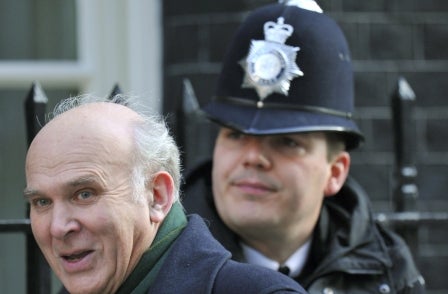
Business secretary Vince Cable went to the Guardian’s defence this morning as the debate continued over its Edward Snowden spying revelations.
He told Radio 4’s Today: “I think the Guardian has done a very considerable public service … The conclusion which Nick Clegg came to, and set out this morning, is that we do need to have proper political oversight of the intelligence services and arguably we haven't until now. What they did was, as journalists, entirely correct and right. Mr Snowden is a different kettle of fish."
Former GCHQ head Sir David Omand told The Times that the Snowden leaks were "most catastrophic loss to British intelligence ever”.
The debate has been prompted by comments made on Tuesday night by head of MI5 Andrew Parker.
Without naming The Guardian he said: “It causes enormous damage to make public the reach and limits of GCHQ techniques.
"Such information hands the advantage to the terrorists. It is the gift they need to evade us and strike at will."
Yesterday Prime Minister David Cameron said: “When you get newspapers who get hold of vast amounts of data and information that is effectively stolen information and they think it's OK to reveal this, I think they have to think about their responsibilities and are they helping to keep our country safe.”
The Daily Mail yesterday launched a vociferous four-page attack on the Guardian accusing it of being “lethally irresponsible” and describing it as “the paper which helps Britain’s enemies”.
Today The Guardian counter-attacked by quoting editors around the world which supported the role it had played in exposing the extent to which the UK and US authorities spy on ordinary members of the public:
The New York Times said:
The accurate and in-depth news articles published by the New York Times and the Guardian help inform the public in framing its thinking about these issues and deciding how to balance the need to protect against terrorism and to protect individual privacy.”
Der Speigel:
The utmost duty of a journalist is to expose abuses and the abuse of power. The global surveillance of digital communication by the NSA and GCHQ is no less than an abuse on a massive scale with consequences that at this point seem completely unpredictable."
Le Monde:
The decision by Edward Snowden to leak to the media an important amount of top-secret documents showing the unprecedented reach of electronic surveillance was a historic event. It has raised major questions on the control of the internet, on the balance between counter-terrorism and civil liberties, on the oversight of intelligence activities by democratic institutions."
Mario Calabresi, editor of La Stampa:
The freedom of the press is so precious that it cannot be restricted or compromised by the accusation of complicity with 'the enemies'. This does not, of course, mean that newspapers can say whatever they want without any kind of control or any kind of responsibility. But from what I understand, the Guardian has carefully scrutinised the documents they received. This is important. In Italy we were very impressed with the time the Guardian took to publish these documents. It meant that you checked and scrutinised them. You cannot be accused of acting simply as a kind of post box. You received a lot of material and then you decided what was fit to print and what wasn't.
Email pged@pressgazette.co.uk to point out mistakes, provide story tips or send in a letter for publication on our "Letters Page" blog
